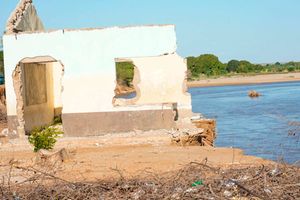Destructive floods could become the new norm, warn scientists

A flooded Mathare River as it passes through Mathare Slums Gitathuru area.
What you need to know:
- This year, several African countries were massively affected by floods triggered by an intensified rainy season as a result of global warming.
Deadly floods could become an annual occurrence in African countries by 2050 if global warming persists, scientists have warned.
Human-induced climate change through the use of fossil fuels has worsened seasonal rainfall this year by up to 20 per cent across the Lake Chad and Niger basin, causing a major humanitarian crisis, the scientists say.
This year, several African countries were massively affected by floods triggered by an intensified rainy season as a result of global warming, as indicated in a new study. The deadly floods have killed hundreds of people and displaced millions across the continent.
The study titled "Conflict, poverty and water management issues exposing vulnerable communities in Africa to extreme floods that are now common events because of climate change' was conducted by researchers from Kenya, Sudan, Egypt, Sweden, United Kingdom and the Netherlands.
“Seasons of heavy downpour have already become the new normal in countries such as Nigeria, Sudan, Chad and Cameroon,” stated a team of researchers at the World Weather Attribution (WWA).
The alert comes as nations are set to congregate next month in Baku, Azerbaijan, for the 29th United Nations Conference of Parties (COP29) summit from November 11 to 22.
“The risk of having extreme floods will continue rising with each fraction of warming,” said Izidine Pinto, co-author of the study and a researcher at the Royal Netherlands Meteorological Institute.
The experts have called upon the upcoming COP29 climate convention to fast-track the transition from fossil fuels to renewable and low carbon energy sources worldwide.
According to the National Disaster Operations Centre (NDOC), at least 291 Kenyans were killed, 188 injured, 75 went missing, 278,380 displaced and nearly 412,763 people were affected by heavy rains and floods witnessed in the country between March 1 – May 16, 2024.
Extensive damages and displacement were caused by heavy downpour and flash floods across East Africa, particularly in Kenya, Uganda, Tanzania, Somalia, Ethiopia and Burundi.
There were 473 deaths, about 410, 350 people were displaced and a total of 1.6 million individuals were affected across East Africa as of May 17, according to OCHA.
“There is a critical situation of waterways and dams across the country. Embankments have been eroded and some dams overtopped. The government has ordered people who live within 30 metres of the riparian areas countrywide to be evacuated immediately. Search and rescue operations are underway alongside evacuation in high risk areas. Authorities have reported damage to 419 water and sanitation facilities and 64 health centres,” OCHA stated in a report.
In Tanzania, 155 people died as a result of floods, landslides and heavy rains; with at least 126,000 persons affected as of May, according to authorities. The Tanzania Meteorological Authority issued an alert in May that the weather pattern, Cyclone Ialy, at the Indian Ocean, is likely to cause heavy rains, high waves and strong winds between May 20 - 22. Mariners and the overall public was urged to take precautionary measures.”
Sudan and Nigeria were the most affected by the heavy rains, with a total of 1,500 fatalities recorded and a million others displaced this year in the Central and West Africa region.
Experts warn that if temperatures rise above pre- industrial levels - 2 degrees Celsius - heavy spells of rainfall like those might occur each year.
In Sudan, scientists focused on millions of individuals displaced by conflict and pushed into areas that experience frequent floods.
Current weather patterns were analysed using modelling where they were compared with weather trends in a world where there is no human-induced warming.
The findings indicated that climate change could have intensified the heavy downpour that engulfed Sudan for months.
According to London’s Imperial College Centre for Environmental Policy, Africa is the hardest hit by extreme weather conditions yet its carbon emissions contribution globally is minimal.





